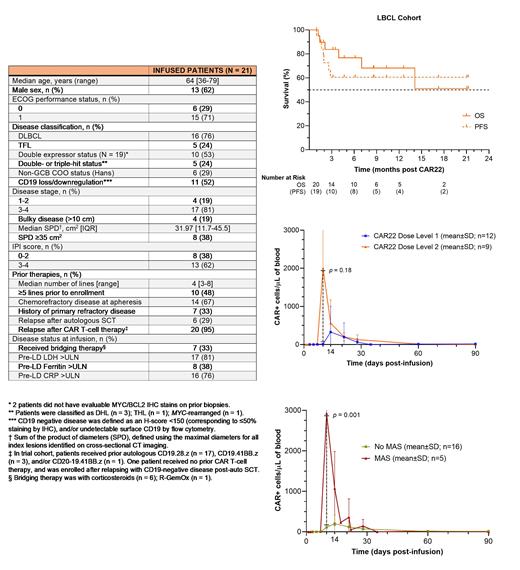Abstract
BACKGROUND: Patients with relapsed/refractory (R/R) large B-cell lymphoma (LBCL) after failure of CD19-directed CAR T-cell therapy (CAR19) have a dire prognosis, with an overall response rate (ORR) of 29% to conventional salvage therapies, and a median overall survival (OS) of 6 months. CD22 is expressed on the majority of B-cell malignancies. Autologous CAR T-cells targeting CD22 (CAR22) have yielded an ORR of 70-90% in pediatric patients with R/R B-cell acute lymphoblastic leukemia (B-ALL), including those who had previously failed CAR19 therapy. Based on these encouraging results, we evaluated CAR22 in adult patients with R/R LBCL, focusing on those with CAR19-refractory disease.
METHODS: This ongoing single-institution phase I dose escalation clinical trial (NCT04088890) is evaluating a CAR construct incorporating the m971 CD22 single chain variable fragments and 41BB/CD3z endodomains integrated within autologous T-cells via lentiviral transduction. After lymphodepletion (LD) with fludarabine and cyclophosphamide, patients are infused with cryopreserved CAR T-cells after a 7- to 11-day closed manufacturing process utilizing the CliniMACS Prodigy device (Miltenyi). Primary objectives assess the ability to successfully manufacture CAR22 and safety. Secondary objectives include efficacy and durability of responses.
RESULTS: Twenty-one patients with LBCL [n=12 at dose level 1 (DL1), 1x10 6 CAR+ cells/kg; n=9 at dose level 2 (DL2), 3x10 6 CAR+ cells/kg] have been enrolled with a median age of 64 years (range, 36-79) and a median of 4 (range, 3-8) prior lines of therapy. All patients had at least one high risk feature, including failure of prior CAR19 therapy (n=20); refractory disease to second-line or later therapy (n=17); elevated lactate dehydrogenase (LDH) pre-LD (n=17); high tumor burden (n=9); a history of primary refractory disease (n=7); failure of prior autologous hematopoietic stem cell transplantation (HSCT) (n=6); never achieving CR to any therapy (n=5); or LBCL with MYC gene rearrangements (n=5). Successful manufacturing of cells was achieved in all patients. All patients reached day 28 post-infusion and are included in the safety and efficacy analysis presented here; updated results will be presented at the meeting. Every patient experienced cytokine release syndrome (CRS); 20/21 (95%) were Grade 1-2, 1/21 (5%) were Grade 3. Four patients (19%) experienced immune effector cell-associated neurotoxicity syndrome (ICANS); all cases were Grade 1-2 and resolved within 2 days. Five patients (24%) experienced a hyperinflammatory macrophage activation syndrome (MAS), manifested in all cases by pancytopenia and consumptive coagulopathy (DIC) requiring transfusion and/or growth factor support. One patient who received DL2 had a Grade 5 infectious event in the setting of ongoing MAS and pancytopenia. Relative to DL1, higher prevalence of Grade ≥3 cytopenias beyond D28 (89% vs. 50%) and MAS (33% vs. 17%) were observed at DL2; thus, DL1 was selected as the maximally tolerated dose (MTD). ORR at D28 was 86% (CR, n=11; PR, n=7), and was similar between DL1 and DL2 (92% vs. 78%; p=ns). 3/7 (43%) initial PR improved to CR at a median of 3 months post-infusion. All 14 patients (67% of cohort) who achieved CR remain in remission, with a mean follow-up of 7.3 months (range, 1.2-21.3); median progression free survival (PFS) and OS have not yet been reached. Five patients died from disease progression, and one patient died from septic shock in CR. CD22 expression by flow was downregulated or absent in 1/3 (33%) patients evaluated after relapse. Peak CAR-T expansion as detected by peripheral blood flow cytometry occurred at a median of 14 days, with a trend towards earlier and higher peak levels in DL2 patients. Significantly higher mean CAR-T levels occurred at peak expansion in patients who developed MAS (1070±915 vs. 196±209 CAR+ cells/μL; p=0.001).
CONCLUSIONS: Infusion of CAR22 in R/R LBCL is safe and well tolerated at DL1. Manufacturing of CAR22 was uniformly successful. With a mean follow-up of 7.3 months, the ORR and CR rates are 18/21 (86%) and 14/21 (67%), respectively. These data demonstrate CAR22 to be an effective salvage therapy for CAR19-refractory or CD19-negative LBCL.
Frank: Allogene Therapeutics: Research Funding; Adaptive Biotechnologies: Research Funding; Kite-Gilead: Membership on an entity's Board of Directors or advisory committees. Oak: Kite Pharma-Gilead: Research Funding. Arai: Magenta Therapeutics: Research Funding. Rezvani: Kaleido: Other: One-time scientific advisory board; Nohla Therapeutics: Other: One-time scientific advisory board; Pharmacyclics-Abbvie: Research Funding; US Department of Justice: Consultancy. Shiraz: Kite Pharma-Gilead: Research Funding. Sidana: Janssen: Consultancy, Research Funding; Allogene: Research Funding; Magenta Therapeutics: Consultancy, Research Funding; BMS: Consultancy. Weng: Kite Pharma: Research Funding. Davis: Novartis Pharmaceuticals: Honoraria; Jazz Pharmaceuticals: Research Funding. Feldman: Samsara Biocapital: Consultancy; Obsidian: Consultancy; Lonza PerMed: Consultancy; Gradalis: Consultancy. Mackall: Lyell: Consultancy, Current equity holder in publicly-traded company, Other: Founder; Syncopation Life Sciences: Consultancy, Current holder of individual stocks in a privately-held company, Other: Founder; Apricity: Consultancy, Current equity holder in publicly-traded company; Neoimmune Tech: Consultancy; Nektar: Consultancy, Research Funding. Miklos: Kite, a Gilead Company, Amgen, Atara, Wugen, Celgene, Novartis, Juno-Celgene-Bristol Myers Squibb, Allogene, Precision Bioscience, Adicet, Pharmacyclics, Janssen, Takeda, Adaptive Biotechnologies and Miltenyi Biotechnologies: Consultancy; Pharmacyclics: Patents & Royalties; Pharmacyclics, Amgen, Kite, a Gilead Company, Novartis, Roche, Genentech, Becton Dickinson, Isoplexis, Miltenyi, Juno-Celgene-Bristol Myers Squibb, Allogene, Precision Biosciences, Adicet, Adaptive Biotechnologies: Research Funding; Adaptive Biotechnologies, Novartis, Juno/Celgene-BMS, Kite, a Gilead Company, Pharmacyclics-AbbVie, Janssen, Pharmacyclics, AlloGene, Precision Bioscience, Miltenyi Biotech, Adicet, Takeda: Membership on an entity's Board of Directors or advisory committees. Muffly: Astellas, Jasper, Adaptive, Baxalta: Research Funding; Adaptive: Honoraria, Other: fees for non-CME/CE services: , Research Funding; Pfizer, Amgen, Jazz, Medexus, Pfizer: Consultancy.
CD22-directed CAR-T therapy for the treatment of adults with relapsed/refractory large B-cell lymphoma


This feature is available to Subscribers Only
Sign In or Create an Account Close Modal